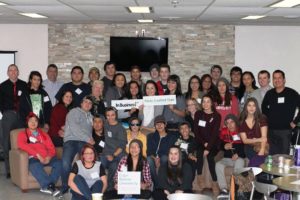Mentorship program for Indigenous youth to help create future business leaders

By Rick Garrick
NORTH BAY—The In.Business: A National Mentorship Program for Indigenous Youth is returning for its second year after connecting high school students in the Eastern Region with First Nation business mentors and peer mentors across the country last year.
“Last year we had five offices running the program covering all 10 provinces and three territories,” says Kyle Thomas, Eastern Regional Manager with In.Business.
“Our goal was to have 60 students in each program, so we were hoping to have upwards of 300 students in our program across Canada last year alone. We didn’t quite reach the 300, but that is a significant number of students just being interested in business and becoming exposed to something they weren’t taught in school or that they didn’t think they were capable of doing. So we are really trying to encourage and promote business as kind of a leadership quality,” added Thomas.
Thomas is currently reaching out to the community for potential First Nation business mentors for the upcoming school year in the Eastern Region, which covers Ontario, Quebec, and Nunavut.
“We’re looking for [First Nation business] mentors who went off to college or university to study something related to business and [who] want to give back and share their knowledge with the high school students,” Thomas says. “Working alongside a mentor really helps students understand business first hand from industry professionals.”
The First Nation business mentors are expected to lead a group of five-to-six high school students ranging from grade 10-12 in a series of business-related activities from November to May, provide guidance based on past business experiences, and attend two conferences during the school year.
“After the opening conference [where] they meet their mentor, [students] participate online through social media for a few months,” Thomas says. “The business mentor will issue them business challenges so they get to experience different topics such as marketing, accounting, human resources, et cetera. After the online component is done, we bring them back for a closing conference, where we bring them on a tour of a local business so they can see how businesses operate. We have an award ceremony and have team-building exercises.”
People who are interested in participating in the In.Business program as a First Nation business mentor can contact Kyle Thomas at (705) 474-3450 ext. 4580, alternately via e-mail at: kyle_thomas@cbu.ca. Mentor application forms are available online.
The In.Business program began as a pilot project in 2011 in Nova Scotia, and was recently launched in the Eastern Region in 2015 with participants that included 32 high school students, six First Nation business mentors, and one peer mentor. The program is made available through a partnership with Nipissing University, in North Bay, Ontario. The In.Business program is also offered in the Atlantic, Central, Pacific, and Northern regions made possible through partnerships with Cape Breton University, University of Winnipeg, Vancouver Island University, and Yukon College.
“The [goal] of the program is to create our future leaders,” Thomas says. “People who typically are involved with business usually work their way up and they become management, they become decision makers, whether it’s in private business or the public sector. So if they’re working for governments, working for band offices, or working for big corporations, they really get to have their voices heard and really become decision makers.”
Thomas says there is a significant gap of Indigenous business leaders compared to the rest of the population.
“The hope for the program going forward is to reach out to as many students as possible,” noted Thomas.
For additional information on the In.Business program, visit the CBU In.Business Program website.

